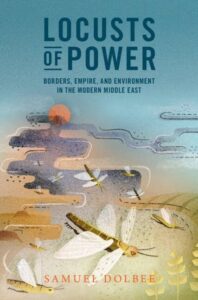
Dolbee, who is also an Assistant Professor of History at Vanderbilt, explains that he took on the leadership of the podcast because he enjoys working with people. Podcasting, he comments, has the merit of “allowing a glimpse of the personal dimension of our work.” Dolbee also likes sound editing and thinks that the production aspect is a fun exercise in thinking about structure. It also creates a sense of intimacy with featured scholars that can sometimes be lacking in academic prose. In his role as editor in chief, Dolbee’s responsibilities are not limited to conducting interviews; the podcast is a complex operation requiring a large team. Dolbee supervises a talented group of more than fifteen scholars in the fields of Ottoman and Middle Eastern history, working on different aspects of the podcast.
 Dolbee’s professional activity also extends to an impressive record of scholarship, research and publication. His interests include environmental history, with a focus on food, disease, agriculture, microbes and viruses. His work has appeared in journals such as Past & Present, the American Historical Review, and International Journal of Middle East Studies. His first book, Locusts of Power: Borders, Empire and Environment in the Modern Middle East (Cambridge, 2023) presents a unique and innovative approach to environmental history, exploring the impact of locusts on the environment and human imagination from the late Ottoman Empire to the Second World War. The book also uncovers surprising continuities and ruptures in the region known as Jazira, the borderlands of modern-day Iraq, Syria, and Turkey. Dolbee’s perspective moves beyond conventional approaches that center on the collapse of the Ottoman Empire or the creation of nation-states, instead emphasizing the importance of environmental change, state violence, and popular resistance in shaping the modern Middle East.
Dolbee’s professional activity also extends to an impressive record of scholarship, research and publication. His interests include environmental history, with a focus on food, disease, agriculture, microbes and viruses. His work has appeared in journals such as Past & Present, the American Historical Review, and International Journal of Middle East Studies. His first book, Locusts of Power: Borders, Empire and Environment in the Modern Middle East (Cambridge, 2023) presents a unique and innovative approach to environmental history, exploring the impact of locusts on the environment and human imagination from the late Ottoman Empire to the Second World War. The book also uncovers surprising continuities and ruptures in the region known as Jazira, the borderlands of modern-day Iraq, Syria, and Turkey. Dolbee’s perspective moves beyond conventional approaches that center on the collapse of the Ottoman Empire or the creation of nation-states, instead emphasizing the importance of environmental change, state violence, and popular resistance in shaping the modern Middle East.
Dolbee highlights the valuable lessons he learned as a history major at UNC. “One thing I truly appreciate is the attention to writing I received from so many people, including Sarah Shields, Jerma Jackson, Louise McReynolds and the late Michael Hunt.” Dolbee recalls with gratitude how carefully these faculty members read his work, even when he didn’t think it deserved their attention. When asked what advice he would give to graduate students currently in the process of writing, Dolbee says that it was important for him to think of writing as a practice; not just something he did when he had great ideas. The ideas that go into the final product are often the result of writing a bad first draft.
Dolbee’s professional activities reflect the History Department’s commitment to both public-facing scholarship and rigorous, pathbreaking research. The department is proud to count among its alumni a scholar who has achieved so much on both counts.
-Burak Bulkan
